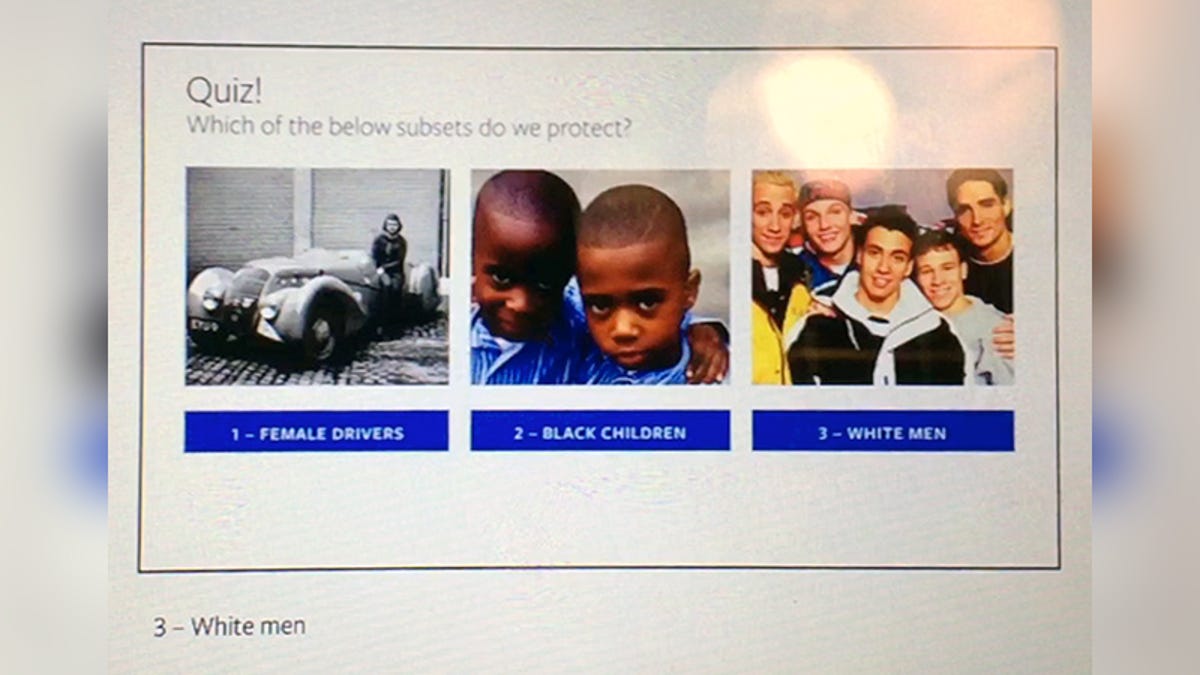Facebook rules protect white men, not black kids, from hate
A ProPublica report says leaked documents show the social network follows complex standards on who is, and isn't, protected from abuse.

Facebook is accused of training censors to delete hate speech against white men, but not black children.
Facebook allegedly trains its workers monitoring hate speech to "protect" white men but not black children and female drivers, according to a report.
The piece published by ProPublica Wednesday, which apparently includes leaked internal training documents used by Facebook moderators, claims the world's largest social network's policies on hate speech "tend to favor elites and governments over grassroots activists and racial minorities."
The article comes a day after Facebook admitted it's having a hard time tackling hate speech, and more than a month after an article in The Guardian shed light on that topic and other "secret rules." In a lengthy blog Tuesday, Facebook said it removes about 66,000 posts a week -- around 288,000 monthly -- for what it considers hateful rhetoric.
The ProPublica article said Facebook trains its thousands of content moderators to delete hate speech directed at so-called protected categories of people, which include race, sex, gender, and religious affiliation. Hate speech against "subsets" of protected categories, such as "radicalized Muslims," is considered less subjected to censorship.
ProPublica points out that the distinctions can be extraordinarily subtle. For example, the publication describes a leaked training slide asking Facebook moderators whether they "protect" 1.) female drivers, 2.) black children or 3.) white men?
The correct answer on the slide is "white men."
"White men are considered a group because both traits are protected, while female drivers and black children, like radicalized Muslims, are subsets, because one of their characteristics is not protected," the publication explains.
That leads to seemingly contradictory decisions on users' comments.
ProPublica also said documents it reviewed shows that President Donald Trump 's posts on Facebook during his campaign proposing to bar Muslims from entering the US, violated the social network's internal rules on hate speech. Reportedly, CEO Mark Zuckerberg personally prevented the posts from being removed.
The article notes the social network, now with 2 billion monthly users worldwide, relies on a US State Department's list of designated terrorist groups and similar databases to help monitor hate speech. It also claims that Facebook has a "secret list" of designated "hate organizations" barred from using the platform.
A Facebook spokeswoman said Thursday that the company's hate speech policies protect against certain characteristics, not categories. If anyone is attacked based on race or gender, that content would be considered hate speech and removed, the spokesperson.
On Tuesday's blog post, Facebook's vice president of public policy, Richard Allan, wrote that the platform is "a long way" from being able to rely on tools like artificial intelligence and machine learning to tackle hate speech.
He mentioned the company has about 4,500 people reviewing posts and plans to hire 3,000 more in the next year.
"It's clear we're not perfect when it comes to enforcing our policy," he said. "Often there are close calls -- and too often we get it wrong."
First published June 29 at 1:21 p.m. PT.
Updated June 30 at 10:25 a.m.: Adds more context from the ProPublica article.
Tech Enabled: CNET chronicles tech's role in providing new kinds of accessibility.
Batteries Not Included: The CNET team reminds us why tech is cool.

